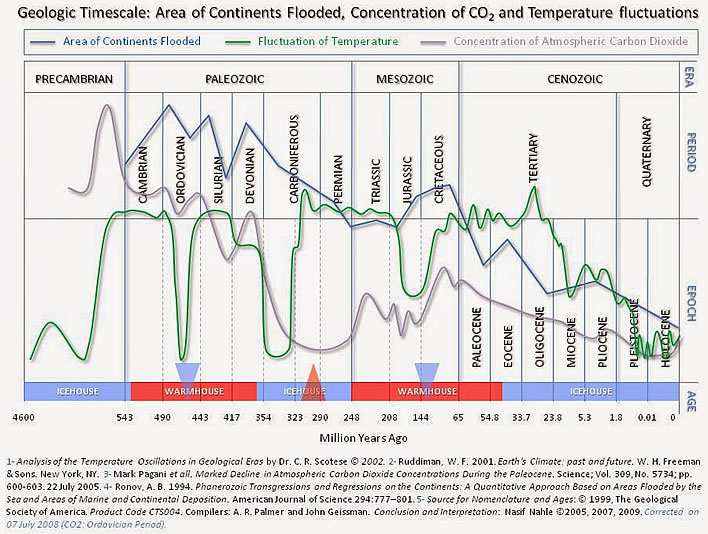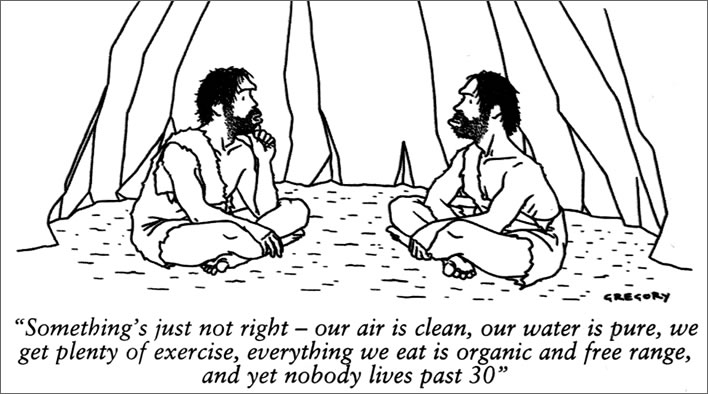Climate facts and a Climate Credo
Richard Law, UTC 2019-10-30 14:22
On his climate blog the admirable Paul Homewood recently presented a reality checklist for the damaged souls condemned to live in the Gretaceous epoch. Paul has spent years tirelessly and calmly debunking the climate nonsense that is thrown at us every day.
His aim in creating this list was to present the important empirical facts about climate without burying the readers in graphs, charts and statistics. He has succeeded very well in this task. We are therefore reproducing his points here, with the addition of one or two asides [in square brackets] and without his UK-specific remarks about energy costs in his points 10 and 11.
Of course, none of these points can be used in arguments with warmist fanatics. For every sane proposition you make they will come back with a catalogue of nonsensical assertions, arguments from authority and 'whatabouts'. As Paul himself points out, those who need to view the supporting evidence for his propositions will have many hours of research ahead of them covering years of postings to his website.
Taking Paul's list as our starting point, we have appended a brief Credo for us climate deniers of the Gretaceous. It should be recited in quiet moments as a way of restoring peace of mind in a world seething with climate nonsense.
The climate sanity check
Global Temperatures
It is generally reckoned that global temperatures have risen by about 1°C since the late 19th century. This however is only a guesstimate at best, as most of the world had very little climate data in those days
According to satellite data [generally considered to be extremely accurate and trustworthy], [global] temperatures have not increased since 1998.
Little Ice Age
Any discussion of temperature rise since the 19th century needs to be put in the context of the Little Ice Age, which lasted around 500 years and ended in the late 19th century.
Scientists believe that this was the coldest period since the end of the [last] Ice Age, and evidence shows that it was a worldwide event, although timings were not always the same.
The Little Ice Age succeeded the Medieval Warm Period, which again appears to have been a global event, during which temperatures were at similar levels to those of today.
[The Medieval Warm Period was preceded by the Roman Warm Period and that in turn by the Minoan Warm Period, interspersed with periods of colder climate. All three of these warm periods were marked by flowerings of historical and cultural development. In contrast, the cold periods in between were times of death, disease, war and famine.]
Glaciers
Melting of glaciers is often held up as 'proof' of global warming. But in fact they began retreating in the 19th century, long before current 'man-made' global warming. There is particularly strong evidence of this fact, as Alaskan and Alpine glaciers were already being closely surveyed as early as the late 18th century.
As the glaciers in Alaska retreat, they are uncovering the remains of ancient forests, which have been carbon dated back to the Middle Ages, indicating the glaciers were much smaller then. Exactly the same has occurred in Patagonia.
Evidence from around the world, including South America and New Zealand, confirms that there was a massive growth in the size of glaciers between the Middle Ages and the end of the Little Ice Age.
Glaciologists have established that many glaciers in both Greenland and Iceland reached their post ice age maxima during the 18th and 19th centuries.
Arctic
We hear a lot about temperatures rising in the Arctic and ice caps melting.
In fact, temperatures around the Arctic are little different now to what they were in the 1930s and 40s. Subsequently they fell sharply in the 1970s and 80s, before rising again. This cycle appears to be connected to multi-decadal ocean cycles
Arctic sea ice retreated as a result [of this rise] until 2007, since when it has remained stable. Satellite data for sea ice extent is only available since 1979, in the middle of the colder interlude, and therefore cannot provide reliable long term trends.
The ice cap in Greenland has also been slowly melting, but the amounts involved are extremely tiny in relation to the total ice mass. Again, long term temperature records in Greenland show that temperatures were as high in the 1930s and 40s.
On a longer timescale, scientists also know that temperatures throughout the Arctic have been much higher than now for the last 10,000 years.
Antarctica
Sea ice around Antarctica has been stable since 1979, if anything, increasing slightly.
NASA has established that the Antarctic ice cap has actually been growing since 1992, because snowfall has more than offset thinning glaciers.
Sea levels
Since the ending of the Little Ice Age in the late 19th century, global sea levels have risen by about 8 inches. Sea levels around the UK give a similar result, after allowing for vertical land movement. (Most of England has been sinking since the [last] Ice Age).
The recent rate of rise has been slightly higher, about 10 inches per century, sea levels were also rising at a similar rate in the mid 20th century.
Extreme weather
There is no persuasive evidence that extreme weather is getting either more common or more severe:
- According to the Intergovernmental Panel on Climate Change (IPCC), there is no evidence of any long term increase in hurricane activity.
- US data confirms that tornado activity has declined since the 1970s, when proper records began. Notably data also shows that there are now fewer of the most violent tornadoes.
- The IPCC also report little evidence that flooding is getting worse.
- Equally they find little proof that droughts are becoming worse globally, though there inevitably regional differences.
- Wildfires, contrary to popular myth, are claiming many fewer acres than they did in the past.
One of the biggest sources for the myth of extreme weather is 24/7 media coverage, which now brings events into our homes which would have gone unreported not long ago.
In the UK, long term data also provides no evidence of an increase in extreme weather, such as storms, floods and droughts.
UK climate trends
According to official Met Office data, UK temperatures stopped rising about fifteen years ago. The summer of 1976 remains the hottest on record, as well as having the most intense heatwaves.
Furthermore there is no evidence of any significant changes in rainfall trends, other than in Scotland which has experienced higher rainfall in recent decades.
Climate projections
All of the scary forecasts concerning temperatures, sea level rise etc. are based on computer modelling of the climate. However these models have consistently grossly overestimated the small rise in temperatures actually experienced.
Our place in Creation
The long view of our place in the grand design is given by the little twiddly bits in the Holocene, bottom-right:

The Climate Credo
- I give thanks always and everywhere that surface temperatures have increased gently and taken us out of the horrible Little Ice Age.
- I give thanks that these surface temperatures have stabilised at the current pleasant level.
- I fervently pray that there will be no collapse of temperatures in the future.
- I rejoice that the glaciers of the world – hateful, barren things – are ceding space in which new life can flourish.
- I believe that the extents of the ice caps and sea ice are stable and are a danger only to those foolish enough to wander around them.
- I believe that sea levels have risen slightly, but present no threat to anyone on Earth.
- I confess that weather continues to be weather.
- I give thanks for the fossil fuels that facilitated the technological revolution which brought the possibility of healthier, longer and more comfortable lives to the great mass of humans.
- Though the climatistas worship their graven models, their false prophets and their deranged children, I cling unshaken to the truth and await the resurrection of sanity in the world.

The clever and iconic cartoon from Alex Gregory in the New Yorker (2013) hits the nail on the head. Image: ©Alex Gregory, The New Yorker.
0 Comments UTC Loaded:
Input rules for comments: No HTML, no images. Comments can be nested to a depth of eight. Surround a long quotation with curly braces: {blockquote}. Well-formed URLs will be rendered as links automatically. Do not click on links unless you are confident that they are safe. You have been warned!